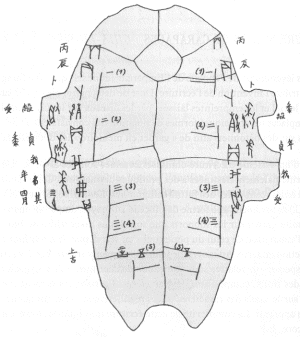1: oracle bone, 2: bronze, Shang, 3: bronze, Western Zhou, 4: bronze, Eastern Zhou
Back to index 'Origins of characters'
The
winnowing basket
1![]() 2
2![]() 3
3![]() 4
4![]()
1: oracle bone, 2: bronze, Shang, 3: bronze, Western Zhou, 4:
bronze, Eastern Zhou
Qi is a picture of a winnowing basket, sometimes on a stand.
Originally it meant to anticipate, expect, so often it can be
translated as:
be expected to, might, will, should, probably, likely. Before a verb it makes
future tense. Nowadays it is often a possessive pronoun, but in old texts for a
possessive pronoun usually jué is used.
On oracle bones it is very often part of the question: one
divination 'it may rain', and a second one, on the other side of the carapace or
bone, 'no rain'. On the carapace below you can find qi at left, in the
corner of the indentation: fei qi, not maybe.

The
entire inscription reads at right: ping chen (day of fire dragon)
divination Ke (the diviner) asks-oracle we obtain millet year-harvest, and at left: ping chen
divination Ke asks-oracle we not maybe obtain millet year-harvest
four moon (in the 4th month). At left at the bottom: above favorable (very
favorable: the oracle' answer). In the middle numbers from 1 to 5, the regions of
crack-making. Outside the carapace the text in modern characters.
Usually qi was used with the less desirable prognostication: softening the
'bad' answer, in order to entice the spirits to give the good
outcome?
The character 'asks-oracle', zhen, is the same Wilhelm translates as
'perseverance'. I call it 'determination', which comprises the act of
oracle consulting or its answer, as well as the perseverance resulting
from following the answer. It is also to test, try out, correct. And it is
the name of the lower trigram of a hexagram. See 'Divination and
regrets'.
The character qi can be found in the Far-East dictionary nr.317, Mathews’ nr.525, Karlgren GSR.nr.952, Li Leyi p.250, Schuessler p.470-ff.